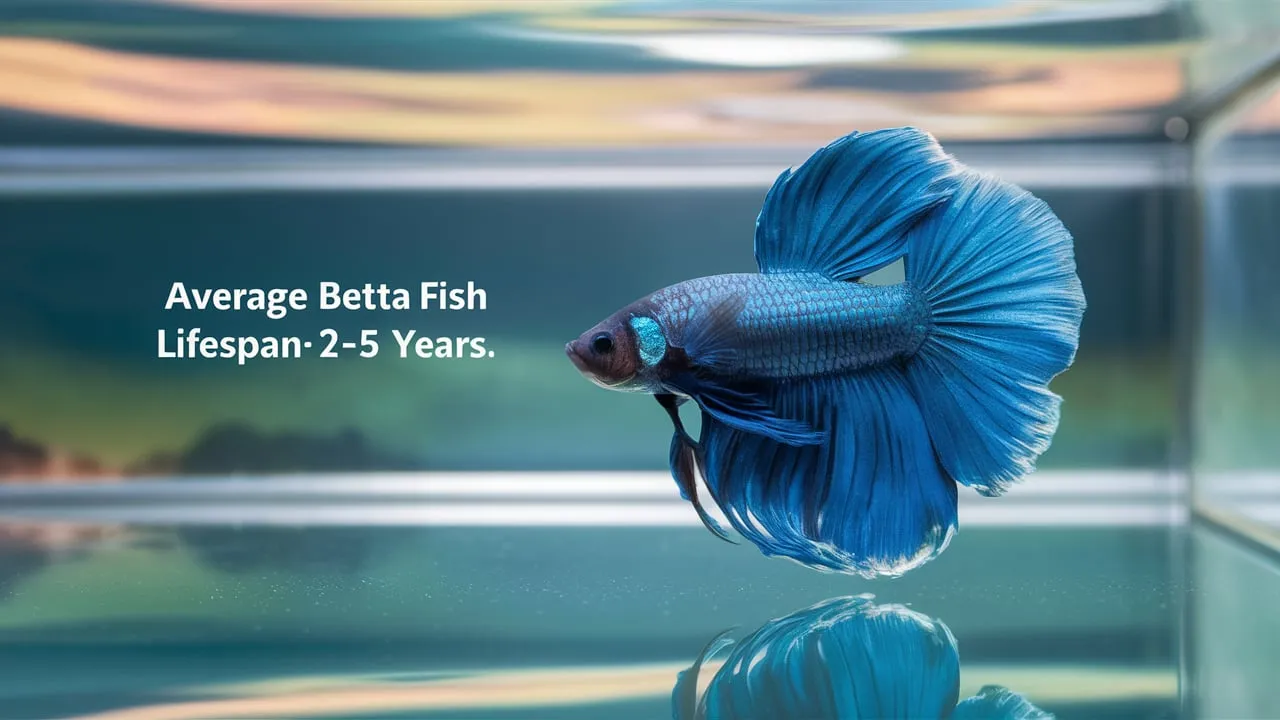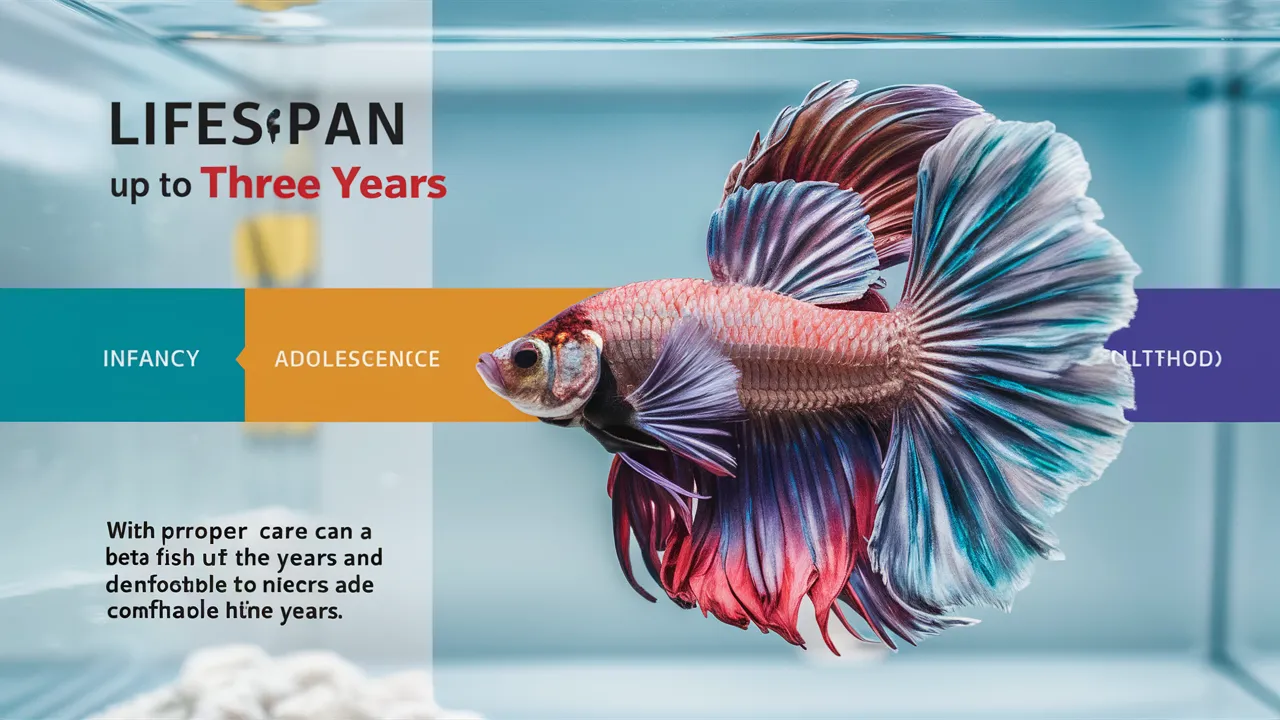Welcome to Betta Fish Guide, your trusted source for all things aquarium-related. Today, we’re diving deep into the fascinating world of Betta Fish Lifespan.
The Average Betta Fish Lifespan
In ideal conditions, with proper care and attention to their needs, betta fish can live for 2-5 years. However, the average lifespan is often shorter, ranging from 1-3 years, due to factors such as poor water quality, inadequate diet, and stress.

Factors Affecting Betta Fish Lifespan
The lifespan of a betta fish can vary significantly depending on several factors:
- Genetics
Just like humans, betta fish have individual genetic predispositions that influence their lifespan. Some betta lines are naturally more robust and resilient than others.
- Water Quality
Maintaining pristine water quality is paramount for the health and longevity of betta fish. Poor water quality, characterized by high levels of ammonia, nitrite, and nitrate, can lead to stress, illness, and a shortened lifespan.
- Diet
A balanced and nutritious diet is essential for betta fish health. A diet consisting of high-quality betta pellets, flakes, and occasional live foods, such as bloodworms and brine shrimp, provides the necessary nutrients for optimal growth and longevity.
- Aquarium Size and Environment
Betta fish thrive in a spacious and enriching aquarium environment. A 5-gallon tank is the minimum recommended size, and larger tanks are always better. Aquarium decor should provide hiding places, areas for exploration, and visual stimulation.
- Temperature
Betta fish are tropical fish that prefer warm water temperatures between 78-82 degrees Fahrenheit. Maintaining a stable temperature is crucial for their health and well-being.
- Stress
Stress can significantly impact the lifespan of betta fish. Overcrowding, poor water quality, inadequate filtration, and frequent handling can all contribute to stress.
- Disease
Betta fish are susceptible to various diseases, including fin rot, ich, and fungal infections. Early detection and treatment are essential for preventing serious health issues and extending their lifespan.

How to Extend Your Betta Fish’s Lifespan?
Here are some practical tips to help extend your betta fish’s lifespan:
- Maintain Pristine Water Quality: Perform regular water changes, use high-quality water conditioners, and monitor water parameters such as pH, ammonia, nitrite, and nitrate levels.
- Provide a Spacious and Enriching Aquarium: A 5-gallon tank is the minimum recommended size for a betta fish, and larger tanks are always better. Include hiding places, areas for exploration, and visual stimulation.
- Offer a Balanced and Nutritious Diet: Feed your betta fish a variety of high-quality betta pellets, flakes, and occasional live foods, such as bloodworms and brine shrimp.
- Maintain a Stable Temperature: Use a reliable aquarium heater to maintain a stable temperature between 78-82 degrees Fahrenheit.
- Minimize Stress: Avoid overcrowding the aquarium, ensure adequate filtration and aeration, and handle your betta fish gently and only when necessary.
- Monitor for Signs of Illness: Observe your betta fish regularly for any signs of illness, such as fin rot, ich, or fungal infections. Seek veterinary care promptly if you notice any health concerns.
Frequently Asked Questions About Betta Fish Lifespan
How long do betta fish live in captivity vs. in the wild?
In captivity, betta fish typically live 2-5 years with proper care. In the wild, their lifespan is generally shorter due to predators, environmental challenges, and limited access to food. Wild bettas may live only 1-3 years on average.
Can betta fish live longer than 5 years?
Yes, with exceptional care and good genetics, some betta fish have been known to live up to 7 years or even longer. However, this is relatively rare and should be considered the exception rather than the rule.
How can I tell how old my betta fish is?
Determining the exact age of a betta fish can be challenging, especially if you didn’t purchase it as a juvenile. Some indicators of an older betta include:
- Faded or duller coloration
- Slower movements
- Decreased appetite
- Curled or ragged fins (in the absence of disease)
Do different betta fish varieties have different lifespans?
While there’s no definitive evidence that certain varieties live longer than others, some breeders and enthusiasts suggest that wild-type bettas or those with shorter fins may have slightly longer lifespans due to less genetic manipulation and reduced physical strain.
How often should I change my betta’s water to ensure a long life?
For a 5-gallon tank, perform a 25-30% water change every week. Larger tanks may require less frequent changes, while smaller tanks may need more frequent maintenance. Always use a water conditioner to remove chlorine and other harmful substances from tap water.
Conclusion
The lifespan of a betta fish is influenced by a multitude of factors, including genetics, water quality, diet, aquarium environment, and stress levels. By understanding these factors and providing optimal care, you can help your betta fish live a long and healthy life. Remember that responsible pet ownership involves providing a suitable environment, a balanced diet, and a stress-free life for your aquatic companion.

Related Posts
How To Tell Male And Female Betta Fish Apart? – Betta Fish Guide
How To Clean Filter Socks In The Aquarium? Tips & Tricks
How To Clean Fish Tank Ornaments? Step-by-Step Guide